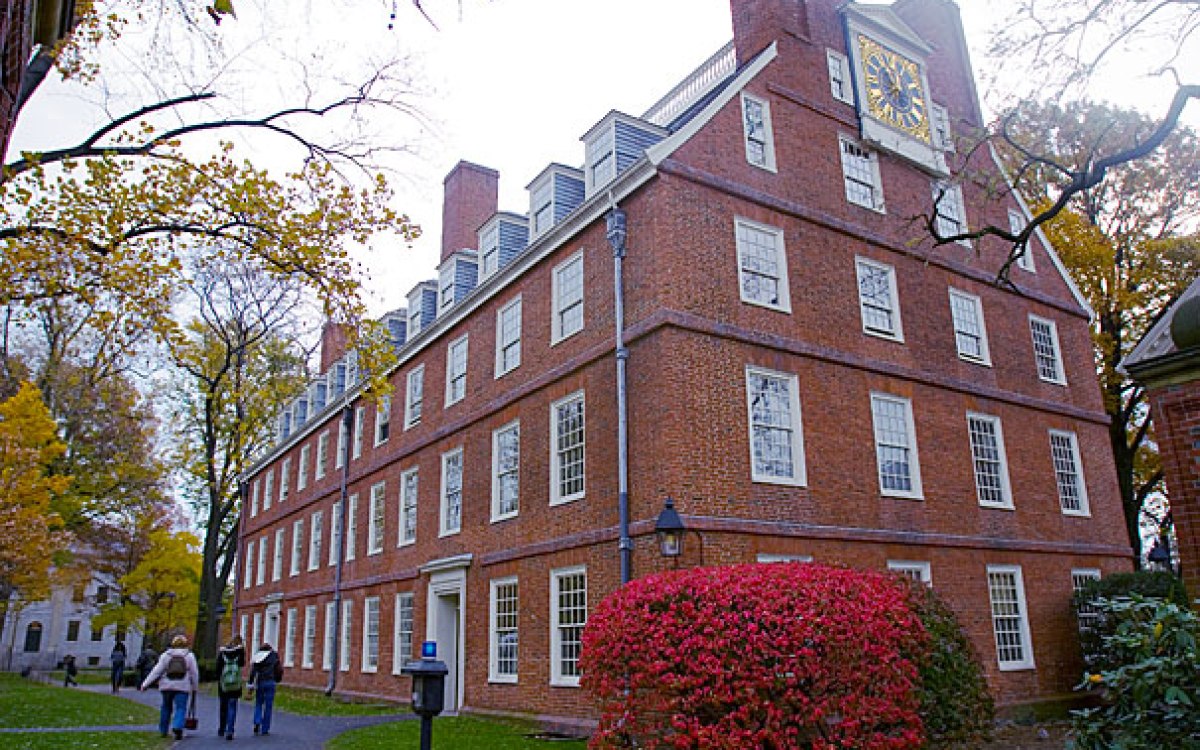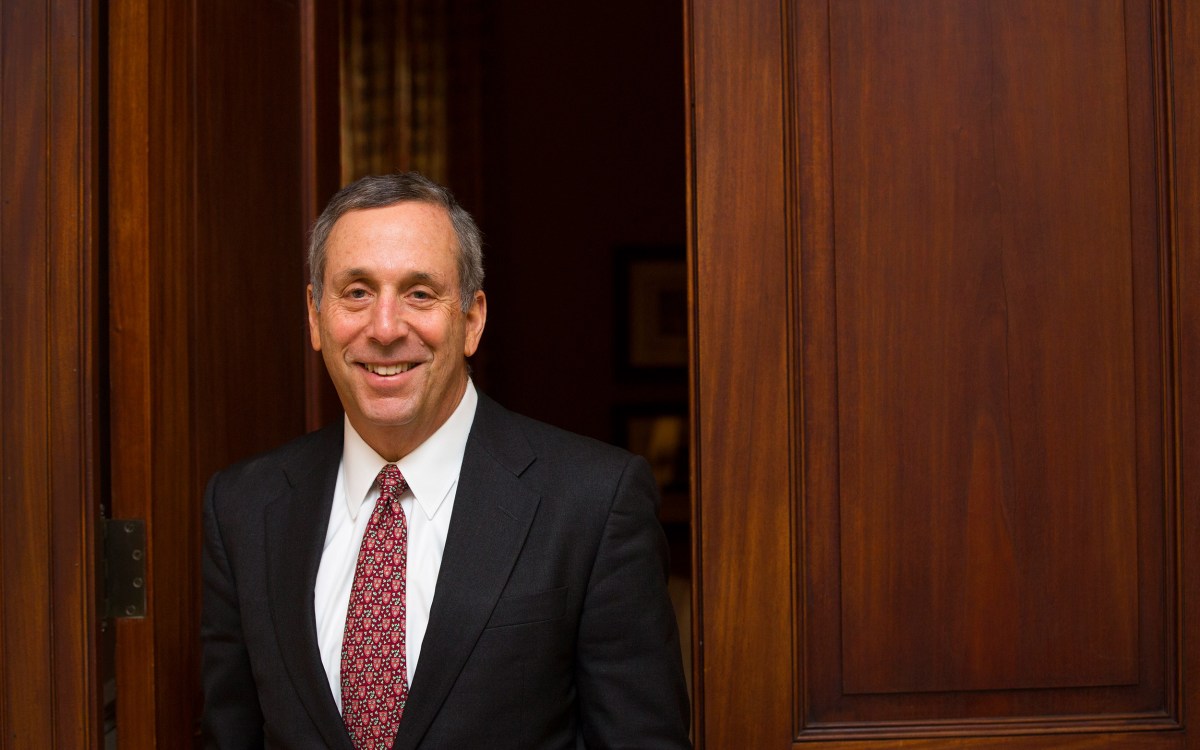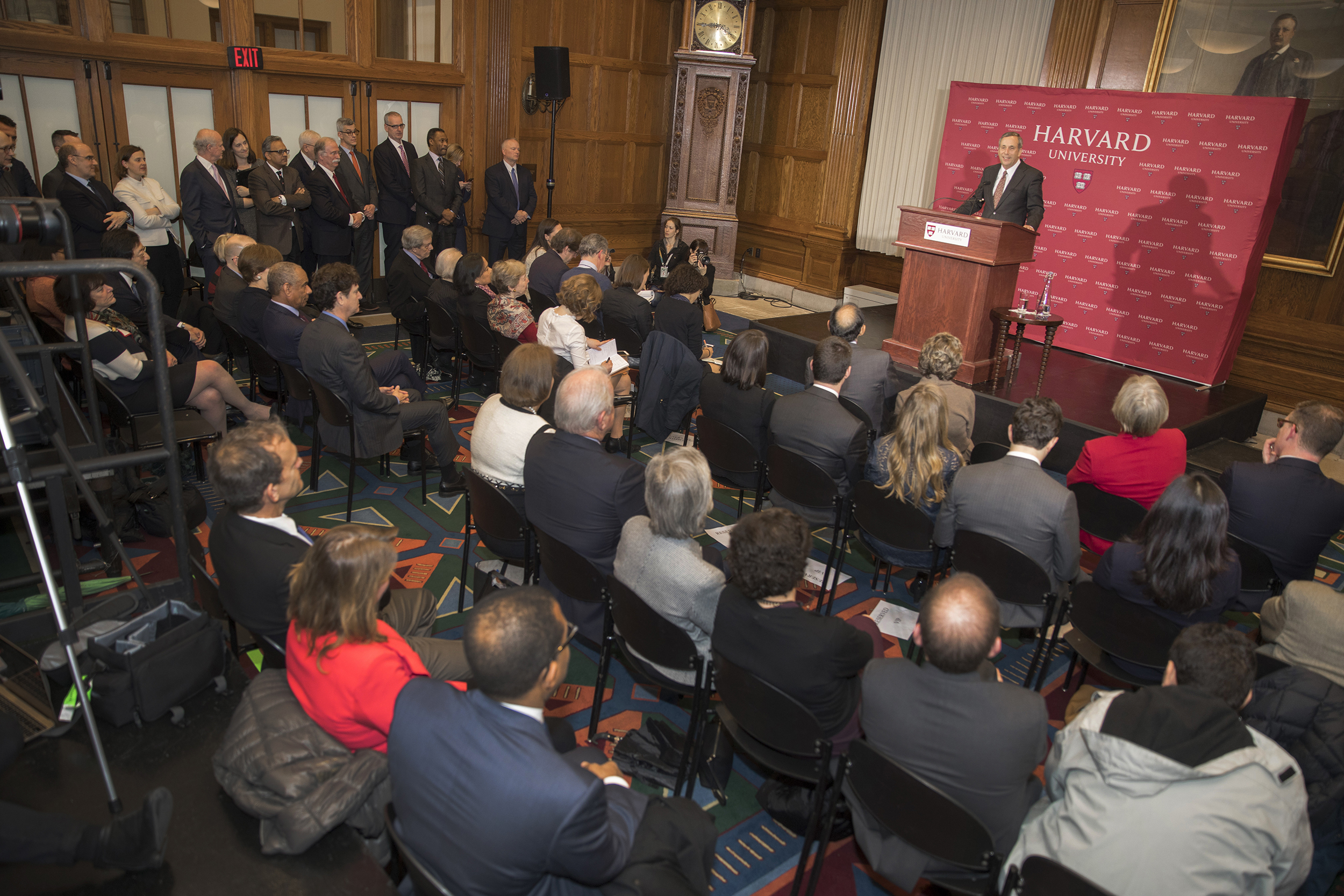
Lawrence S. Bacow takes the podium Sunday after he was introduced as Harvard’s next president.
Kris Snibbe/Harvard Staff Photographer
Praise, optimism in reaction to Bacow choice
Members of Harvard community, from deans to faculty to students, respond to naming of next president
As news spread Monday about Harvard’s choice of Lawrence S. Bacow as the University’s next president, members of the academic community and others praised the selection of the former Tufts University president, lawyer, economist, and environmental policy expert, who in July will become Harvard’s 29th leader in 381 years.
Deans, faculty, and students across Harvard lauded the choice of a seasoned leader who they said is highly respected, driven, and dedicated to expanding student access and opportunity and to helping institutions of higher learning address some of the world’s pressing challenges.
David Ellwood, the Isabelle and Scott Black Professor of Political Economy and a member of the faculty group that advised the presidential search committee, called the choice of Bacow “inspired.”
“Like nearly every one of my colleagues when I was a dean, I turned to Larry for the wisest counsel when I would need it most,” says David Ellwood, pictured. “Harvard has selected a wise, inspiring, and humane leader.”
Stephanie Mitchell/Harvard file photo
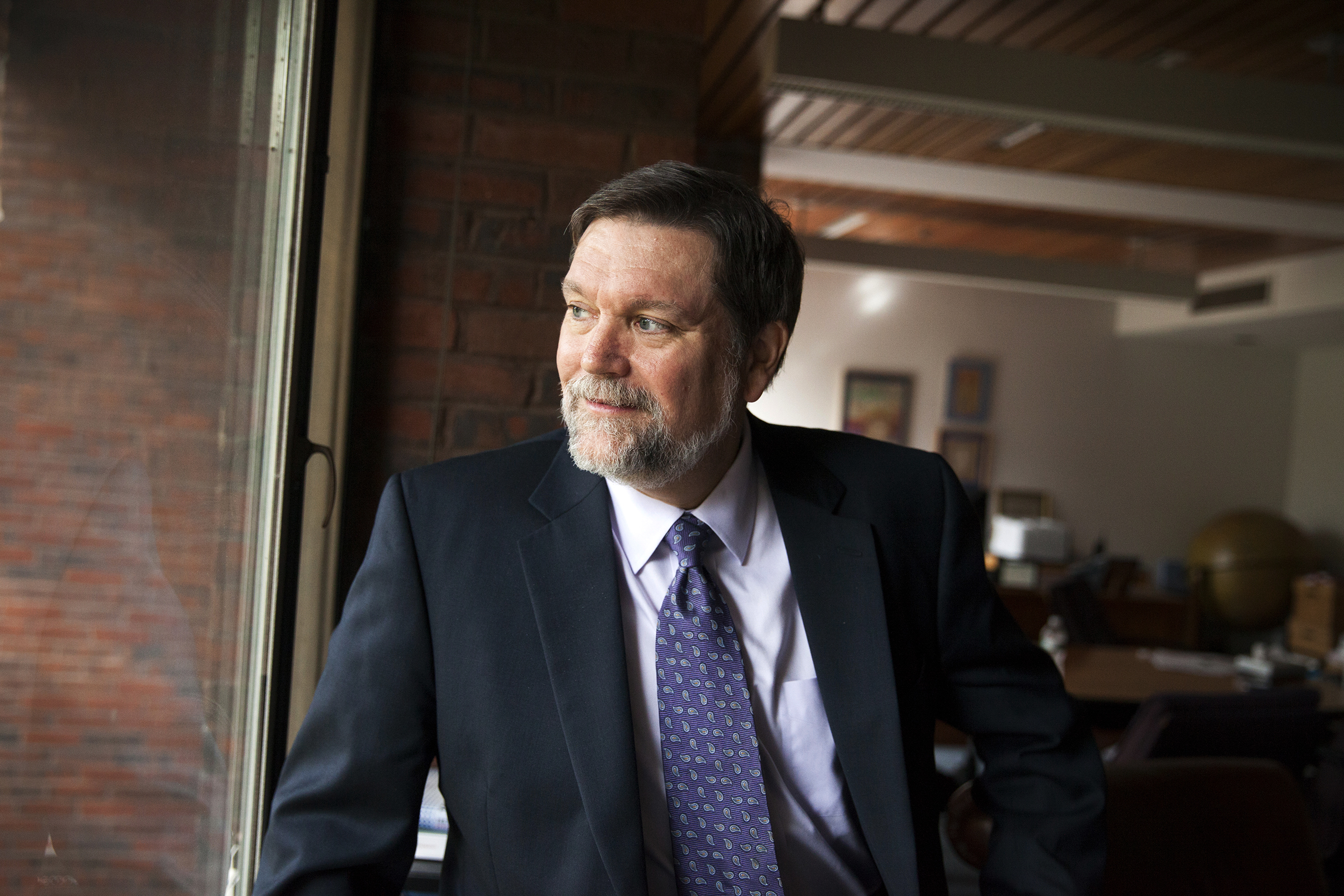
“His intense commitment to his core values of excellence, service, humanity, integrity, and open discourse are drawn from his earliest lessons growing up, and from many years of exceptional educational leadership,” said Ellwood, whose tenure as dean of the Harvard Kennedy School (HKS) from 2004 to 2015 overlapped with Bacow’s HKS appointment as Hauser Leader-in-Residence in the School’s Center for Public Leadership in 2014.
“Like nearly every one of my colleagues when I was a dean, I turned to Larry for the wisest counsel when I would need it most. Harvard has selected an inspiring and humane leader.”
Dean Huntington D. Lambert of the Harvard Division of Continuing Education (DCE) also praised the choice, saying Bacow’s “dedication to improving student success and fostering new paths for learners are two pivotal areas that we are deeply passionate about at the DCE. I look forward to working with Larry as DCE continues to extend Harvard to nontraditional and summer learners and help Harvard reach his goals” of ensuring broader access to higher education.
John Silvanus Wilson Jr., M.T.S. ’81, Ed.M. ’82, Ed.D. ’85, former president of Morehouse College, a Harvard Overseer, and past executive director of the White House Initiative on Historically Black Colleges and Universities (HBCU), has known Bacow for more than 25 years. They worked closely while at Massachusetts Institute of Technology (MIT), Wilson as an administrator and Bacow as chair of the faculty. Wilson recalled Bacow’s keen ability to synthesize complex ideas and arguments and his ease at managing occasionally tense discussions during faculty policy meetings.
“He was able to navigate through what often were conflicts and disagreements, and he was able, always skillfully, to elevate everyone’s understanding of whatever we were discussing to a higher place. That always impressed me.”
But Bacow’s heart, said Wilson, matched his intellect. Wilson, who served as a head of house on the MIT campus, remembers when Bacow, then MIT chancellor, and his wife comforted students and faculty after a tragedy.
“We experienced a student death, and that’s when I saw his true humanity. He had the skills and compassion and understanding and depth of human spirit to reach people. It is a very rare and special virtue for a leader. I saw Larry lead with head and heart at MIT, and I think he is a better man and a better leader because he is that way.”
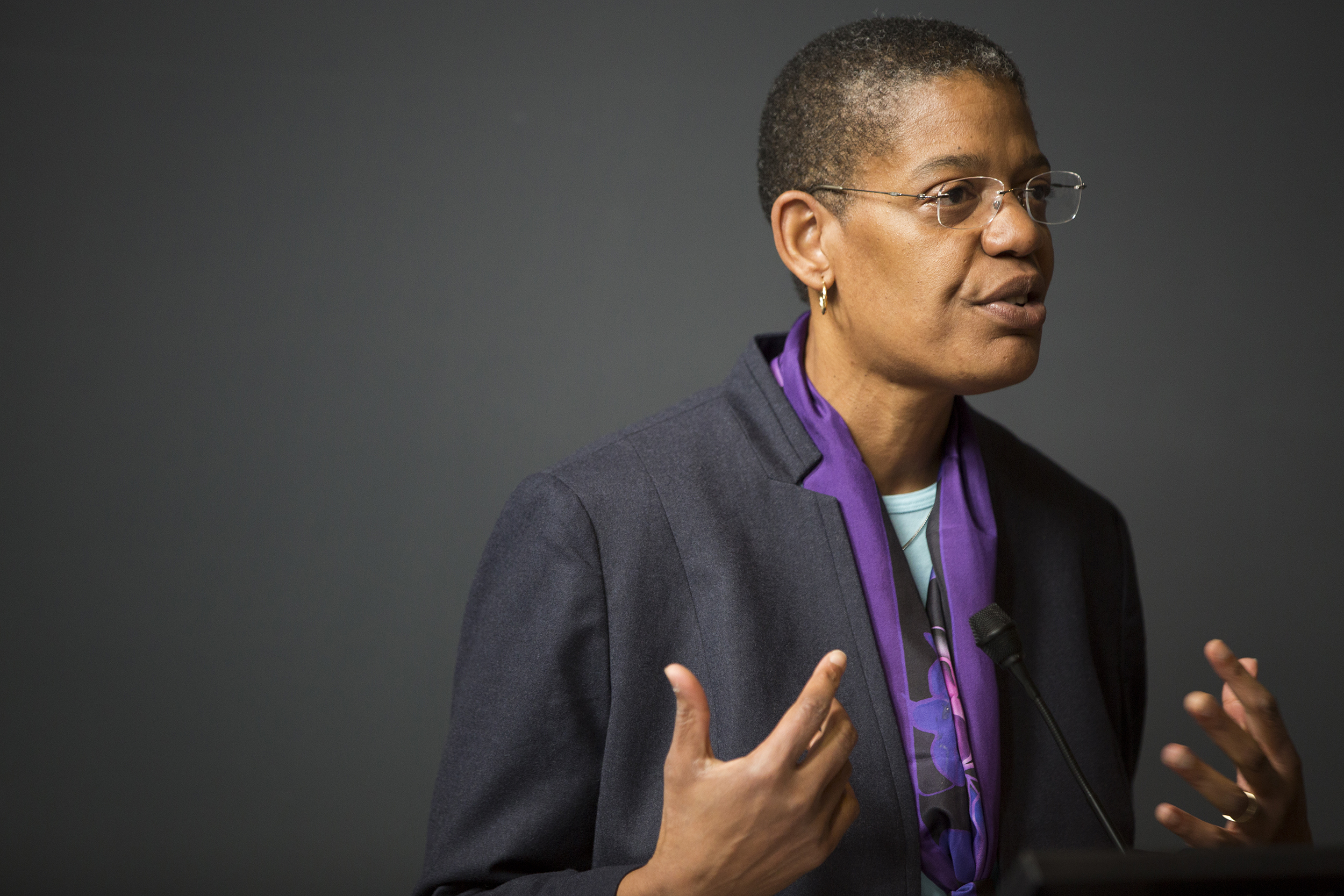
Stephanie Mitchell/Harvard file photo
“Larry’s experience as a leader, his personal belief in the power of higher education to change lives, and his strong commitment to building on President Drew Faust’s legacy of positive impact through engagement with local and global communities make him the ideal president for our time.”
Michelle Williams, above
Many in the Harvard community issued congratulations to Bacow on social media, among them psychologist Steven Pinker, who was once on the MIT faculty with Bacow. “Delighted to welcome my former colleague, the wise and witty Larry Bacow, as the 29th president of Harvard,” tweeted Pinker, Harvard’s Johnstone Family Professor of Psychology.
“Congratulations to Lawrence S. Bacow … I look forward to working with him to address some of our most pressing global health challenges — including climate change,” tweeted Dean Michelle Williams of the Harvard T.H. Chan School of Public Health.
https://twitter.com/FernandoReimers/status/962799516561920004
https://twitter.com/AndrewDeanHo/status/962849507791769600
https://twitter.com/TuftsUniversity/status/962794726498996224
Williams expanded on that note Monday afternoon, saying, “Larry is deeply knowledgeable about Harvard, deeply familiar with the Harvard Chan School, and exceptionally well-positioned to lead the University at a time when higher education is facing new political headwinds and public health issues — particularly the issue of climate change and health — are in danger of being neglected or becoming needlessly politicized. Larry’s experience as a leader, his personal belief in the power of higher education to change lives, and his strong commitment to building on President Drew Faust’s legacy of positive impact through engagement with local and global communities make him the ideal president for our time.”
University of Miami President Julio Frenk, former dean of the Harvard Chan School, said of Bacow, “His stature as a widely admired leader in higher education makes him an inspired choice to lead Harvard. After the remarkable achievements of President Drew Faust, the selection of Larry Bacow assures a bright future for Harvard. Like so many others, I have benefited from Larry’s insightful advice. From his new position, he will continue to be a strong voice in defense of all that universities stand for.”
Author and journalist Walter Isaacson, ’74, a former member of Harvard’s Board of Overseers, called Bacow “an awesomely qualified candidate — with great values, instincts, leadership skills, and humanity” in a tweet Monday afternoon.
In a letter to the Harvard Divinity School (HDS) community, Dean David N. Hempton said Bacow’s “astonishing breadth of expertise includes environmental policy, bargaining and negotiation, economics, law, and public policy… Bacow is also one of the most respected voices in American higher education. His passion for inclusion and access will drive Harvard and HDS’s commitment to diversity, to service, and to student opportunity.”
Claudine Gay, another member of the faculty advisory committee on the presidential search, lauded the selection and said she is “optimistic about what the future holds” under Bacow’s leadership. “I am excited about Larry’s appointment and about the diversity of perspectives he will bring to the role: as an academic who understands the importance of connecting scholarship to the urgent problems of the day; as someone with a deep understanding of Harvard; as an academic leader with a wealth of experience from other institutions,” said Gay, the Wilbur A. Cowett Professor of Government and of African and African American Studies and dean of social science in the Faculty of Arts and Sciences.
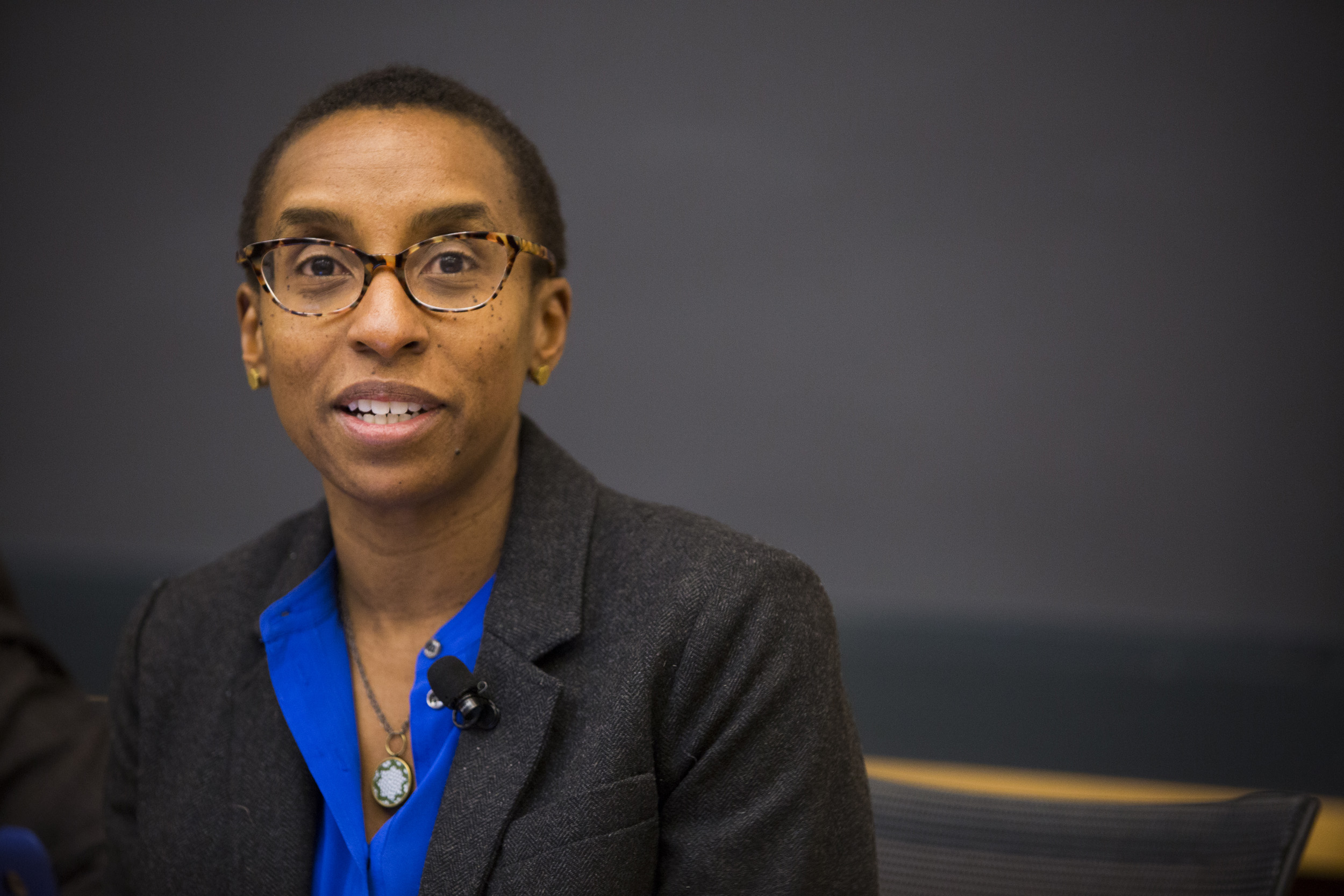
Claudine Gay.
Stephanie Mitchell/Harvard file photo
Students interviewed across the campus Monday afternoon agreed that Bacow had the resume to do the job. Some also offered the incoming president a list of priorities as varied as their backgrounds.
Benjamin Sperling, a freshman from New York City, said faculty at his high school seemed at odds with administrators. He hopes Bacow makes strong connections with faculty and with students. “I’m looking for improved discourse among all three groups,” said the 18-year-old.
In the Science Center, Andre Chatfield, a Kirkland House senior and member of the basketball team, said he shared a concentration with the incoming president and hopes he can ponder the needs of student athletes who have rigorous team demands that can rival academic ones.
“My freshman year, we made the NCAA tournament, and fall of my junior year we traveled to China to play Stanford,” he said. “We had to miss classes, and it’s hard to find a balance. He could have an understanding of that balance.”
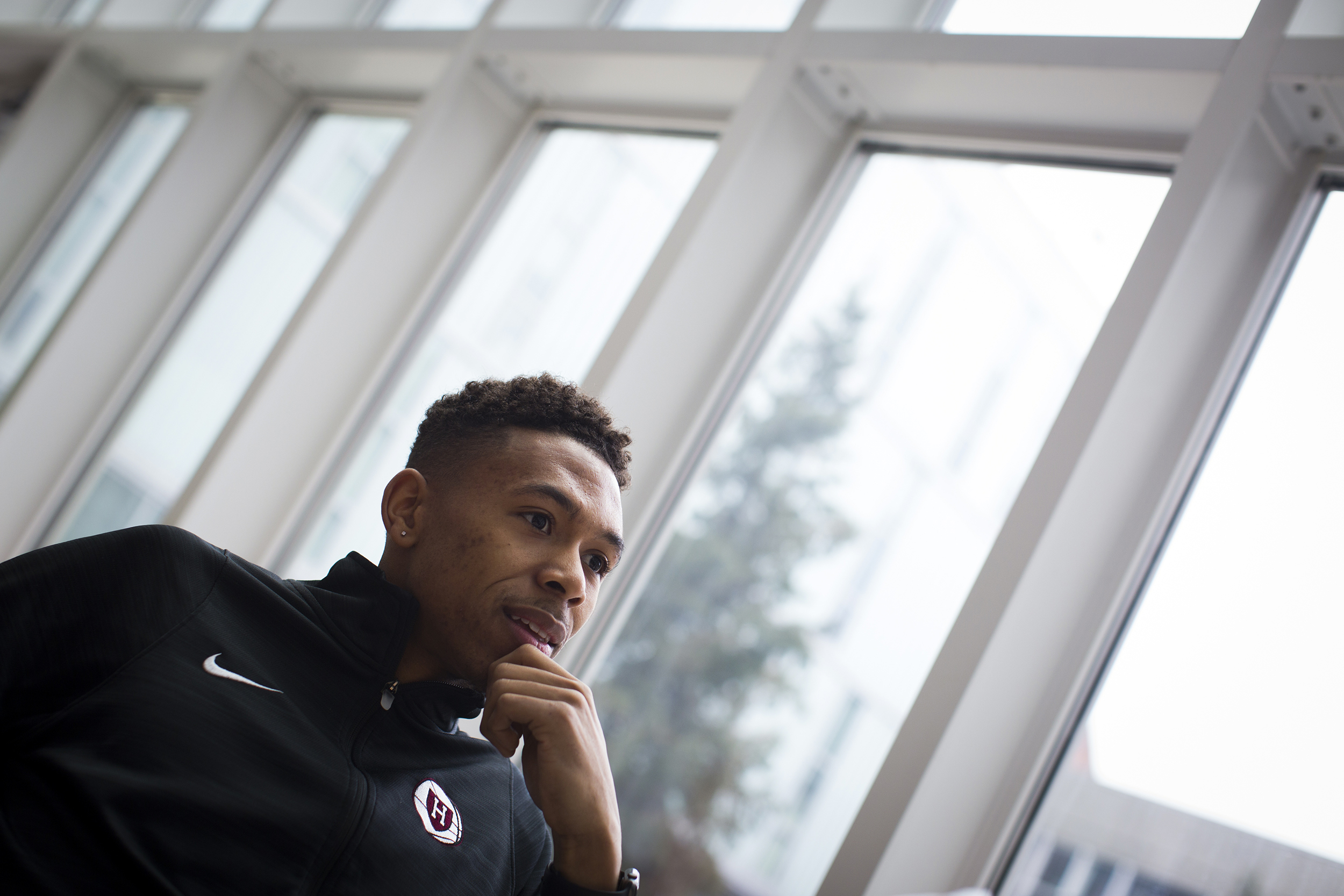
Andre Chatfield.
Stephanie Mitchell/Harvard Staff Photographer
Jake Gober hopes Bacow spends time with students. The 21-year-old applied-math concentrator, who plans to work at a New York startup after graduation, said town hall-style meetings could be a device for reducing any disconnect that some students may feel with administrators.
“Having some connection between students and the administration is really important,” he said. “That should be a big part of his schedule.”
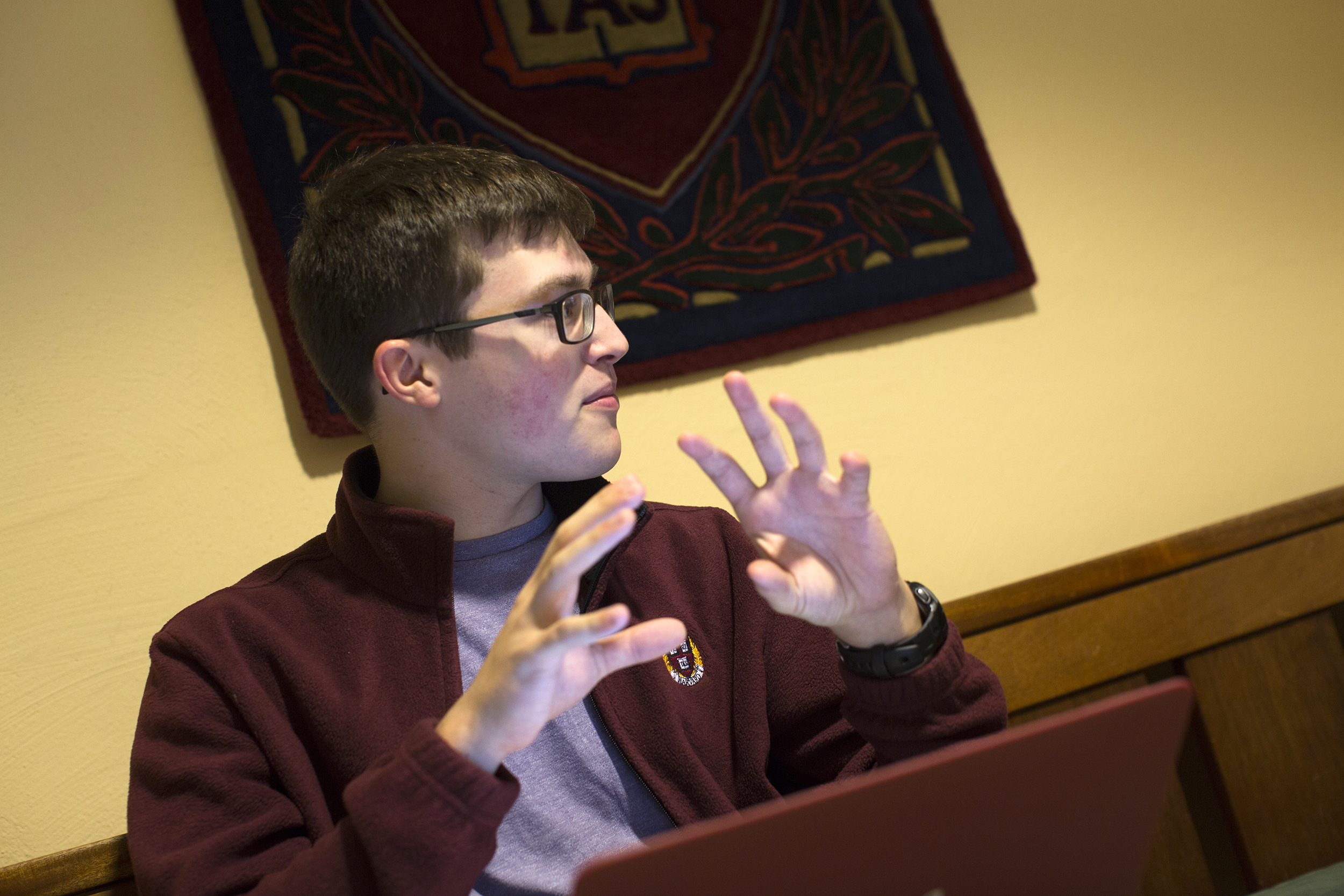
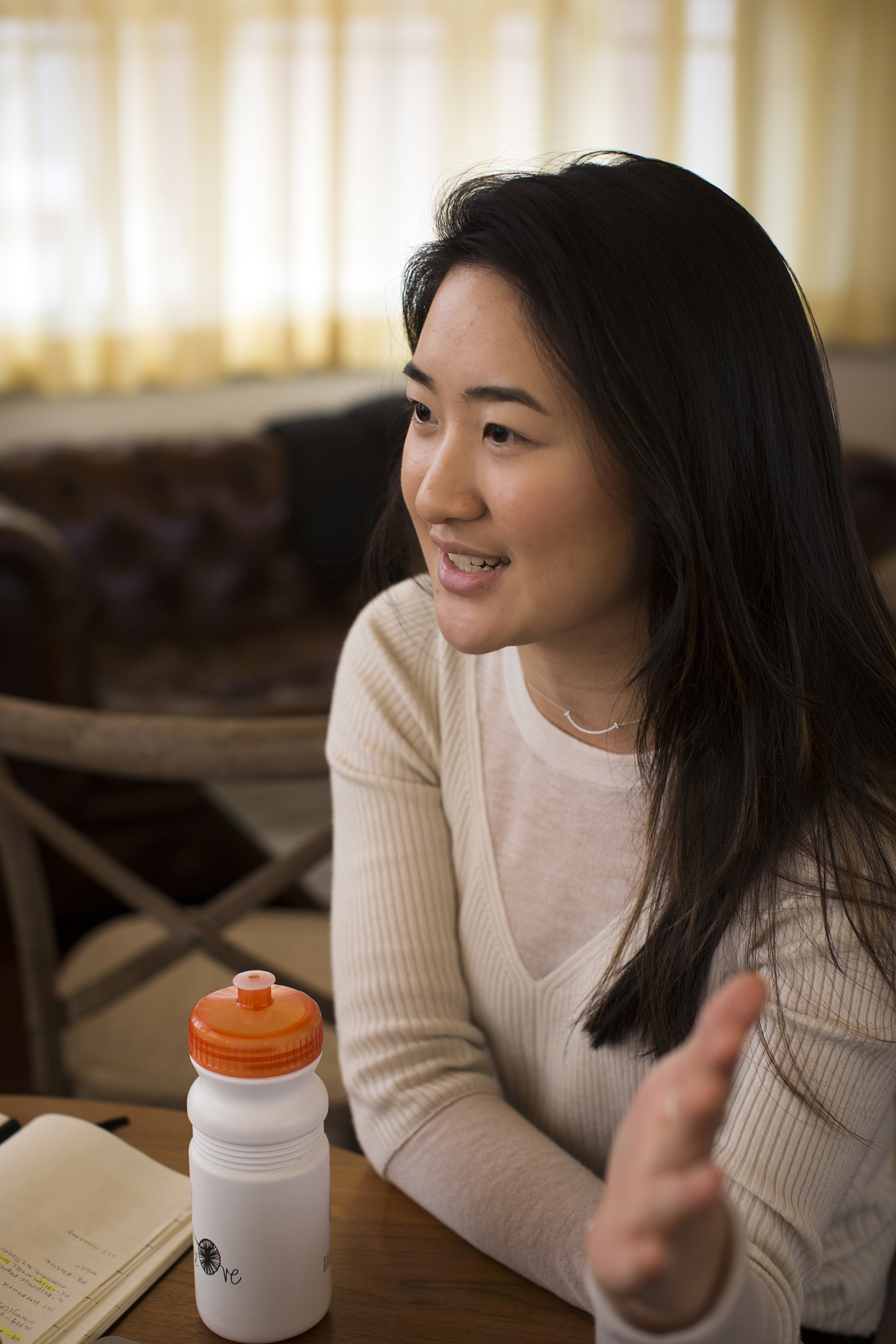
Ben Sperling; Kaylee Kim.
Stephanie Mitchell/Harvard Staff Photographer
“A lot of what [Bacow] will do in the next years will set precedent not just for Harvard, but other universities.”
Kaylee Kim
Sitting in the Science Center lobby with Gober was Raj Vatsa, who was “surprised” to hear of the presidential choice. “I am hopeful he will be a president who actively advocates for diverse backgrounds and identities,” said the 21-year-old senior, who shares a home state (Michigan) with Bacow.
An applied-math concentrator who plans to attend medical school, Vatsa said he has close friends on campus who are directly affected by the Trump administration’s tough immigration policies and the threat facing Dreamers, the undocumented students who have been protected from deportation under the Deferred Action for Childhood Arrivals (DACA) program.
“It’s very important the next president actively lobby for immigration and human rights in general,” he said.
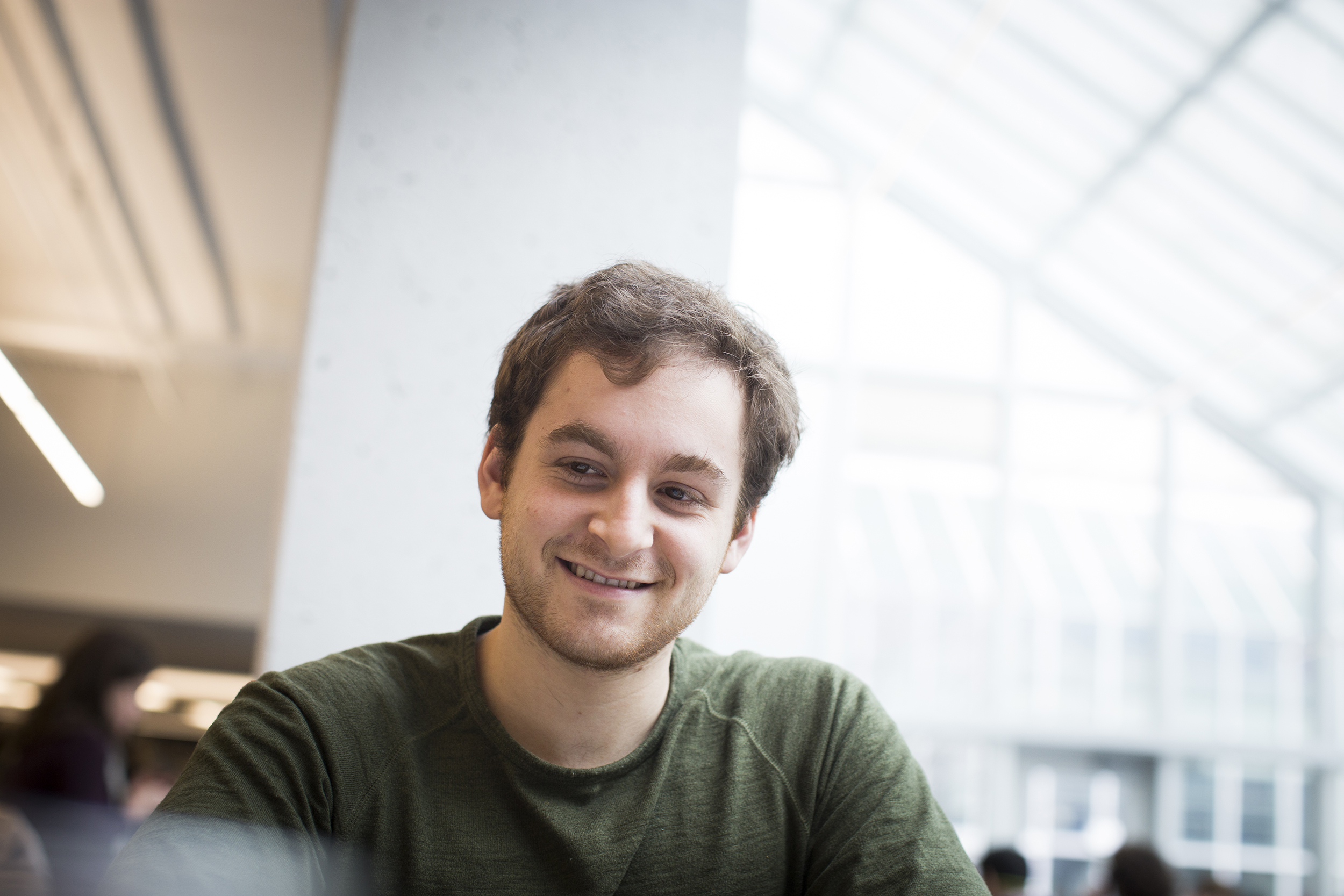
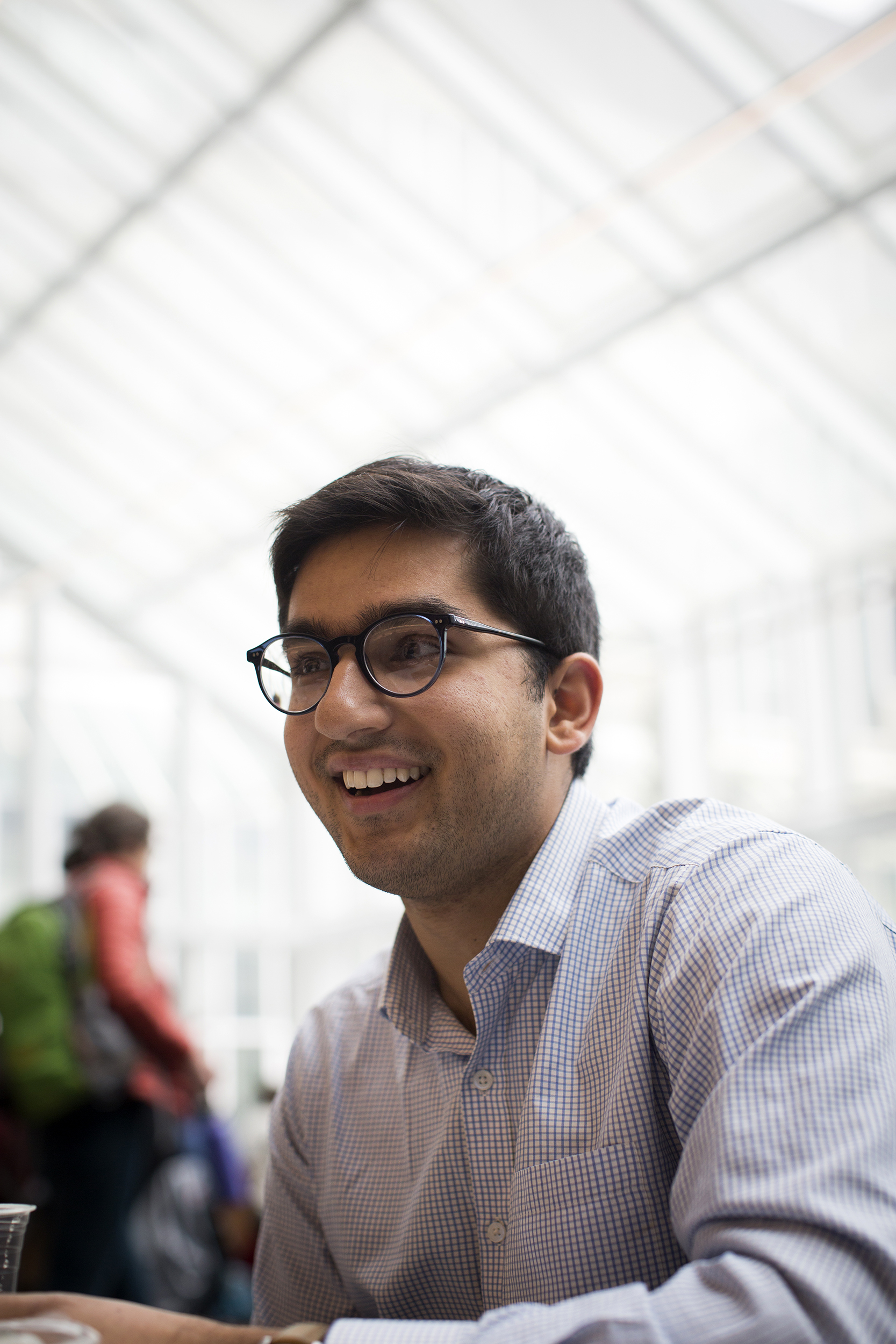
Jake Gober; Raj Vatsa.
Stephanie Mitchell/Harvard Staff Photographer
Several students said they hoped Bacow would continue prioritizing environment issues. Ben Austin, a government concentrator, said he thinks Bacow should build upon President Faust’s recently announced climate goal that would make the University fossil-free by 2050.
“I like his commitment to environmental policy,” said the 20-year-old sophomore. “Harvard is a leader, and to set that precedent now is very important in a time when government is reversing regulations.”
Kaylee Kim, a history and literature concentrator, said she thinks Bacow is “positively qualified,” and came across in his press conference as a nice person. That quality was important to the 20-year-old, who said she heard about the announcement not through campus sources, but in a New York Times notification to her phone.
“Sometimes I ‘forget’ I go to Harvard,” she said. “A lot of what he will do in the next years will set precedents not just for Harvard, but other universities.”




